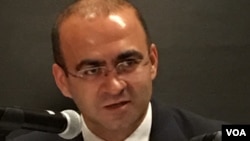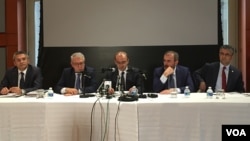A group of Turkish lawmakers is in Washington to press U.S. officials to honor Ankara's request for the extradition of a former imam accused of orchestrating the Eurasian country's latest coup attempt.
"We would like to see America take some serious steps" against Fethullah Gulen and, while mulling Turkey's extradition request, "put him in custody or prevent his activities" on U.S. soil, Kamil Aydin, a lawmaker from the right-wing Nationalist Movement Party (MHP) told VOA.
He and three other Turkish lawmakers met U.S. officials Monday at the Justice Department before proceeding to further talks at the Department of Homeland Security and the State Department.
The meeting at the Justice Department "was very collaborative," said the delegation's leader, Taha Ozhan, who chairs the Foreign Affairs Commission in Turkey's Grand National Assembly.
Ozhan, a member of the Justice and Development Party (AKP) co-founded by President Recep Tayyip Erdogan, warned of serious consequences for U.S.-Turkish relations and the global fight against terrorism if Washington does not heed Ankara's extradition request.
During remarks at the Turkish Embassy, Ozhan asserted that regional and global stability could be affected if Gulen remains in the U.S. or is allowed to flee. He said Gulen, a legal resident in the United States, heads a global terrorist organization "with more offices than the United Nations."
U.S. response
State Department officials are reluctant to discuss the status of the extradition request, defaulting daily to a response that documents submitted by Turkey are being studied at the Justice Department.
Several U.S. diplomats, speaking on the condition they not be named, have expressed skepticism about Turkey's alarmist characterization of Gulen's movement and worry that the extradition demand is jeopardizing a decades-old strategically important bilateral relationship.
What is certain about Gulen's well-funded group is it has millions of followers in Turkey and regards Erdogan as a dictator.
Since the July 15 coup attempt, the Turkish president — using powers under a state of emergency — has severely cracked down on alleged Gulen sympathizers, purging tens of thousands of soldiers, prosecutors, judges and civil servants. Dozens of media organizations have been ordered to shut down, and journalists detained.
"I believe the U.S. will not allow a terrorist organization to take hostage our relations," said Ozhan, describing it as unacceptable that the 75-year-old Gulen, legally residing in the U.S. state of Pennsylvania, is allowed to appear daily on television and "freely contact anybody he wants."
Gulen, in interviews, has denied any involvement in the coup.
Turkey is a NATO member and critical ally in the fight against the self-proclaimed Islamic State, making its Incirlik Air Base available for airstrikes against the extremist group. Concerns were raised when Turkish authorities temporarily cut electrical power to the facility after the coup attempt.
Military strain
U.S. military generals have openly expressed worry about key colleagues in the Turkish military being taken into custody since the attempted coup and persistent rumors in Turkey that the United States played a role in it.
Thousands of citizens poured into the streets to oppose the uprising, which appeared to instantly unite partisans across Turkey's bitterly divided political spectrum.
In an attempt to demonstrate support for Turkey's elected government and soothe the frayed military relationship, the chairman of the Joint Chiefs of Staff, U.S. Marine Corps Gen. Joseph Dunford, met Monday in Ankara with Turkish Prime Minister Binali Yildirim.
The general reiterated to the prime minister that Washington condemns the coup attempt and fully supports Turkish democracy.
The United States should show a "clear and decisive stance," Yildirim told Dunford, according to the prime minister's office.
Turkey on Monday announced it had detained 11 soldiers who allegedly attacked a hotel where Erdogan was staying when the coup attempt began. It said nine generals and 300 other soldiers implicated in the attempted government overthrow remain at large.
Numerous observers of Turkey characterize the country as torn between two Islamic movements: one led by an increasingly authoritarian Ergogan, who is criticized as weakening rule of law and governing institutions, and the other by the enigmatic Gulen, who lives in virtual isolation in a sprawling rural American compound.
Gulen was previously put on trial in absentia in Turkey in 2000, and acquitted in 2008.








